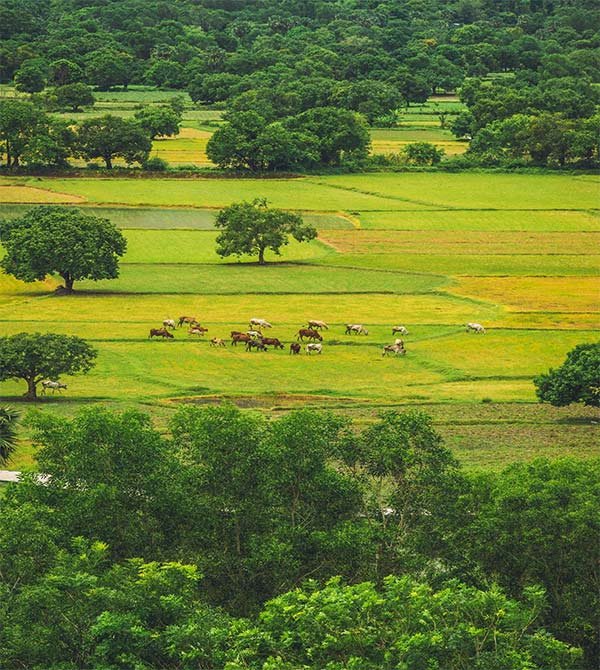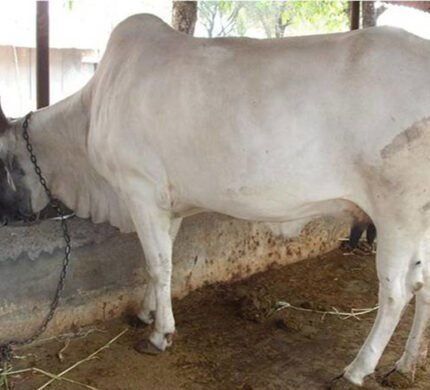Deoni Cow
- Temperature:Hot and Humid environments
- Milk:5-6 liters of milk per day
- Food:Grazers, fresh grass and hay
- Pregnancy:Around 280-290 day
- Nationality:India
Where we find this cow to buy?
Deoni cows are primarily found in India, particularly in the Maharashtra, Karnataka and Andhra Pradesh regions. If you’re looking to buy Deoni cows, you may want to start your search by contacting local farmers or dairy co-operatives in those regions. They may be able to direct you to breeders or sales agents who specialize in Deoni cows.
You can also try searching online for livestock classifieds and marketplaces in India. There are several online platforms available, such as indiamart.com, agrowbook.com, and agribegri.com, that offer listings for Deoni cows for sale.
It’s important to make sure you purchase Deoni cows from a reputable breeder or seller who can provide you with the necessary documentation and health certificates. Before making a purchase, it’s a good idea to visit the farm or breeding center to inspect the cows and ensure they are healthy and well cared for.

How to increase milk production in Deoni Cow?
01
Provide Proper NutritionDeoni cows need a balanced and nutritious diet to produce milk. Their diet should include a mix of high-quality forages, grains, and protein supplements.
02
Ensure Clean And Comfortable HousingDeoni cows require a clean and comfortable living environment to maximize milk production. The barn or housing should be well-ventilated, dry, and free from excessive noise or disturbances.
03
Regular Milking ScheduleA regular milking schedule should be followed with a routine time interval. Milking at the same time every day will help the cow’s body to produce milk regularly.
04
Proper Health CareDeoni cows should receive regular health checkups to prevent and treat any diseases or infections. A healthy cow produces more milk.
Medicine
some general types of medicines and treatments that may be used in Deoni cows:
01
Vaccinations are important for preventing infectious diseases such as foot-and-mouth disease, anthrax, and blackleg. Deoni cows may require specific vaccinations based on their geographic location and the local disease prevalence.
02
Deoni cows, like all cattle, can be affected by internal and external parasites such as worms and ticks. Parasite control measures may include deworming medications, insecticide treatments, and pasture management strategies.
03
Antibiotics may be used to treat bacterial infections such as mastitis, respiratory infections, and foot rot. However, it is important to use antibiotics judiciously and follow proper withdrawal times to prevent the development of antibiotic resistance.
04
Deoni cows, like other cattle, may benefit from reproductive management techniques such as hormonal treatments to synchronize estrus cycles and improve breeding efficiency. Other reproductive management techniques may include artificial insemination and embryo transfer.
- Breeding: Deoni cows should be bred during their fertile period, which is typically between 15 and 90 days after calving. It's important to work with a veterinarian or experienced breeder to ensure that the cow is in good health and is bred with a suitable bull.
- Nutrition: Pregnant Deoni cows require a balanced and nutritious diet to support the developing calf and maintain their own health. This may include additional forage and concentrate feeds, as well as mineral supplements.
- Health Monitoring: It's important to monitor the pregnant cow's health throughout the pregnancy. This may include regular veterinary check-ups, as well as monitoring the cow's body condition, weight, and feed intake.
Important!
It’s important to work with a veterinarian or experienced breeder to manage pregnancy and calving in Deoni cows, as they can provide guidance on proper nutrition, breeding, and care to ensure the health and well-being of the cow and calf.
Food
Deoni cows require a balanced and nutritious diet to maintain their health and maximize milk production. Here are some general guidelines for feeding Deoni cows:
There should be a high proportion of high-quality forage, such as alfalfa, clover, and grasses, included in the diet of a Deoni cow. Fresh, clean water should also be available at all times.
Deoni cows may require concentrates such as grains or protein supplements to meet their nutritional needs. Age, weight, and milk production will determine the type and amount of concentrate.
Deoni cows also require mineral supplements to maintain their health. There are a number of trace minerals that can be found in this group, such as calcium, phosphorus, and salt.
Deoni cows should be fed at regular intervals, typically twice a day. The amount of feed given should be based on the cow’s nutritional needs, as well as their milk production level and other factors.
It’s important to ensure that the feed given to Deoni cows is of high quality and free from contaminants or toxins. Feeds should be stored in a clean, dry, and rodent-free area to prevent spoilage.
Regular monitoring of the cow’s weight, body condition, and milk production can help ensure that they are receiving an appropriate diet and that any nutritional deficiencies or health problems are addressed promptly.
Facts
Here are some interesting facts about Deoni cows:
Deoni cows are a breed of cattle native to the Indian state of Maharashtra.
high-quality milk is produced by them and they adept well to the local environment.
Ghee and paneer, which are both made from Deoni’s cow milk, are ideal dairy products.
The breed is known for its resistance to diseases, as well as its ability to tolerate hot conditions.
Deoni cows have a docile temperament and well-suited to intensive farming systems.
Deoni cows are medium-sized animals, typically weighing between 400 and 500 kg.
The Deoni breed is recognized by the Indian government as a “national breed”.
Deoni cows is a traditional part of maharatra’s agriculture and culture.
